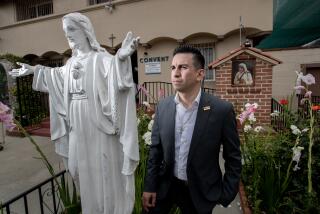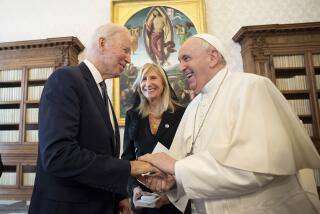Theological Dissent Brings New Truths to Catholicism
- Share via
The precise issue at stake in my case with the Congregation for the Doctrine of the Faith is the legitimacy of theological dissent from some non-infallible hierarchical teachings; the issue does not involve the infallible teaching of the church. The primary presupposition is that I am a Roman Catholic doing Roman Catholic theology within the Catholic faith commitment.
The whole church is called to creative fidelity with regard to the word and work of Jesus, which must be preserved and made meaningful in the light of the contemporary historical and cultural circumstances. Within the Catholic Church, a special teaching office is given to the Pope and bishops. In the light of this understanding of both mission and role, one must avoid overly simplistic and erroneous ways of framing the question under discussion in my case. Above all, the issue is not just the broad question of the freedom of conscience. One cannot deny certain truths and still be a Catholic Christian.
The precise question concerns the relationship between the hierarchical teaching office and the role of the theologian. Official Catholic teaching, canon law and Catholic theologians today distinguish infallible from non-infallible hierarchical teachings. This distinction came into prominence in the 19th Century when papal infallibility was defined. At that time it was recognized that previous teachings on some issues had been wrong. Church law holds that Catholics owe “a religious respect of intellect and will” to hierarchical teaching. There is a presumption of truth in such teaching, but the possibility remains that such teaching might be wrong. It is fallible.
The United States bishops in 1968 recognized the legitimacy of theological dissent from non-infallible teaching “if the reasons are serious and well-founded, if the manner of dissent does not question or impugn the teaching authority of the church, and is such as not to give scandal.”
My theological dissent has not involved matters at the core of faith. It involves ethical judgments on matters that, by their very nature, cannot offer a certitude that excludes the possibility of error. There is certitude in holding that the Christian must be faithful, hopeful, just, chaste and so on. But in the midst of complexity and many competing values, one cannot claim to know with absolute certitude what is just, or faithful, or chaste.
History reminds us that official hierarchical teaching has been wrong in the past, even in the area of morality. Official teaching once condemned interest-taking as immoral, denied the right of the accused to silence, banned Jews from participating in public life, and even in the latter half of the 19th Century did not hold slavery to be intrinsically evil.
In hindsight, some earlier teachings are very embarrassing today. In his encyclical Quanta Cura in 1864, Pope Pius IX condemned as “erroneous” the idea, then popular in a Europe moving toward democracy, that freedom of conscience and worship is an inherent human right that should be guaranteed by society.
Some changes in hierarchical teachings have evolved since the earliest days of the church. This can be seen in the official understanding of marital sexuality, which at first was thought to be somewhat “wrong.” After St. Augustine, the accepted teaching maintained that marital relations could be justified only because of the intention of procreation. Later, that intention was no longer required. Pope Pius XII in 1951, in accepting the rhythm method of birth control, even taught that steps could be taken to avoid procreation.
Catholic morality in the tradition of Thomas Aquinas has always stressed its intrinsic nature. The question is best phrased in the following way: Is something commanded because it is good, or is it good because it is commanded? For Thomas Aquinas and the Catholic tradition, something is commanded because it is good.
Authority is necessary in the church. Catholics accept the authority of the Pope and bishops. But authority in teaching matters is not the ultimate; it “is not superior to the word of God, but is its servant,” in the words of the Second Vatican Council. That is, it is the servant of the truth. And all in the church are engaged, in different ways, in service of the truth, which, as history records, is often obscure.
Theology, as the systematic study of Christian faith and life, has an important role. Theological dialogue and discussion are necessary if the word and work of Jesus are to be meaningful in the contemporary circumstances. Growth, which must characterize the existence of the church, will bring with it inevitable tensions. Theology by its very nature should be on the cutting edge--probing, pushing, expanding the horizons. The hierarchical teaching office by its very nature will tend to lag behind the theological enterprise. Theologians will make mistakes, but at times their dissent will speak the truth.
The living church will always experience the tension of serving the truth in love. More adequate procedures are needed to safeguard both truth and love, but in the end the necessary tension will always remain. All of us involved should try to abide by the age-old axiom: in necessary things, unity; in doubtful things, freedom; in all things, charity.


